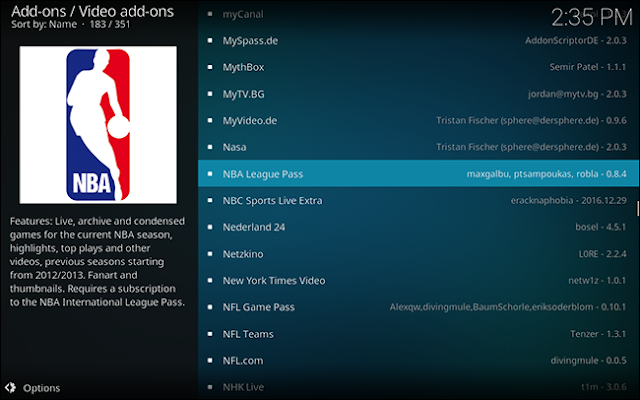Kodi Is Not a Piracy Application
There’s a piracy app that lets users find any TV show, movie, or song you can imagine. Streams and downloads are both easy to find, and the software is already used by hundreds of millions of people.
The name of this dastardly program? Google Chrome.
That’s a crazy thing to report, right? Sure, it’s strictly true that you can use Chrome to pirate movies and TV shows: just search for any movie’s name followed by the words “streaming,” “torrent,” or “download.” You’ll find a pirated option on the front page basically every time. But if a mainstream media outlet called Chrome a piracy tool, you’d ridicule them for it, and deservedly so.
But that’s pretty much how Kodi, the open source media player, is being reported on lately, particularly in the UK. The BBC called Kodi a piracy epidemic in a headline. The Mirror pointed out that Kodi offers a “way to find illegal streams of movies and sports presented with a friendly Netflix-style user interface.” The Birmingham Mail helpfully informed readers that downloading Kodi will result in you getting a scary letter.
Reading these headlines, you’d think Kodi is the second coming of Popcorn Time. It’s not. Kodi is merely a (very good) media player and organizer. If Kodi is a piracy app, so is Google Chrome (and, for that matter, QuickTime or VLC).
Why Is Kodi Getting Such a Bad Rap?
If you aren’t familiar with Kodi, it’s an open source media center application designed to be used from the couch, with a remote control—not unlike the old Windows Media Center that used to come with your computer.
It’s designed for users with a large media collection of ripped Blu-Rays, DVDs, and CDs who want to watch them from a PC (or other Kodi-compatible device) connected to their TV. Kodi provides an easy-to-browse interface for these collections, complete with cover art and thumbnails. You can also use it to watch and record live TV, with cable or using an over the air antenna. There’s nothing illegal about any of this, though of course there’s nothing stopping users from filling their Kodi library with pirated content.
That, however, is not the reason Kodi is making headlines lately: add-ons are the source of controversy. Much like Google Chrome, Kodi allows programmers to create add-ons that extend Kodi’s capabilities, and most of these add-ons connect to streaming services on the Internet. There are free services, like YouTube and Vimeo, and ways to access subscription services, like NHL.tv and Amazon Prime. There’s nothing particularly controversial about these legal add-ons, however.
Some add-ons, however, link to pirated streams. They’re fairly easy to use, when they work, and completely useless when they (inevitably) break. Even worse, some third party companies and individuals have started installing Kodi on cheap mini-computers, with piracy add-ons pre-installed. Then they sell them as “Kodi boxes,” despite being completely unaffiliated with the actual team behind the Kodi project.
Users who don’t know what Kodi is are happy to have free content, which is coming to them courtesy of these third party piracy add-ons. But as a result, these uninformed people have come to think of Kodi as a piracy app.
Kodi Is Fighting Back, But it’s Not Working
The Kodi team has made it very clear these third party add-ons and boxes have nothing to do with the Kodi itself. The upcoming version of Kodi requires users to allow third party repositories, and warns users inside the interface that Kodi itself does not support them. The Kodi team has also banned all mention of piracy add-ons from the official Kodi forum, wiki, and official Reddit page. The official Twitter account tells users complaining that pirated streams aren’t working to stop pirating things.
Just to repeat it again. Those "fully loaded" piracy box sellers and those Youtubers promoting it are killing Kodi
To cap it all off, the Kodi team member Nathan Betzen published a blog post stating that these piracy box sellers are killing Kodi. To quote Betzen:Team Kodi is officially tired of this. We are tired of new users coming into the forum, asking why the box that ‘we’ sold them was broken. We are tired of this endless campaign by dishonest salesmen to push a single use of Kodi that nobody on the team actually recommends. We are tired of these salesmen lying to users, claiming that pirate streams and pirate boxes are ‘legal’ when they are absolutely not at some level or other. We are tired of being told by companies that they don’t want to work with us, because we are selling pirate boxes. Being removed from an App Store this summer because of the campaigning of others was like a slap in the face. Most of all, we are tired of a thousand different salesmen and Youtubers making money off ruining our name.
The Kodi team, made up of volunteers, is doing everything they can to distance themselves from the piracy ecosystem that popped up around their platform. And still the media mentions Kodi as though the brand itself is shorthand for piracy.
But Kodi isn’t a piracy tool. It’s an open ecosystem, and some third parties have decided to build piracy tools on top of it. If that makes Kodi a piracy app, so is Google Chrome. Heck, pretty much all pirates use either Microsoft Windows, macOS, or Linux to download things: why not call those piracy tools as well? It makes about as much sense.
Some media outlets eventually corrected their articles, in the BBC’s case because of a letter writing campaign by Kodi fans. And I suppose that’s the only hope for Kodi to clarify things: supports continuously speaking up. Here’s hoping the message eventually gets through.





No comments:
New comments are not allowed.